CAIRO —
Reaction in the Middle East was mixed to the U.S. decision to take the debate over alleged chemical weapons usage by the Syrian government to Congress.
Syrian state TV showed government supporters expressing support for the army, and its announcers sounded a defiant note against the U.S. after a planned military action was delayed for debate in the U.S. Congress.
Syria's Deputy Foreign Minister Faisal Mekdad described President Obama as "hesitant and confused" for his decision to seek congressional approval for a military strike against Syria.
A professor of international law at Damascus University told Syrian TV that Syria had tentatively prevailed over countries “trying to commit aggression against it,” but that the U.N. weapons inspectors had been prevented from carrying out their original mission:
He said that weapons inspectors were invited to investigate (the alleged use of chemical weapons by the opposition) in Khan al Assel (outside Aleppo), but were prevented from that mission by (the new crisis in Damascus' suburbs), meant to divert attention from a rebel chemical weapons attack.
At a press conference in Damascus, the Iranian parliament's foreign affairs committee chief, Ala'a Eddin Borojurdi, insisted that Tehran “condemns the use of chemical weapons,” but accused rebels of “using hand-made chemical weapons” against government troops.
'Playing with fire'
Borojurdi also accused the U.S. of “playing with fire” by supporting what he called Sunni Islamist “terrorists” among the Syrian rebels:
He claimed that U.S. President Barack Obama and U.S. allies are supporting terrorism in the region and will now have to present an account to their peoples for what they are doing.
In Cairo, Arab League foreign ministers held formal and informal meetings Sunday to discuss the crisis in Syria. Saudi Foreign Minister Saud al Faisal told a press conference that it was high time that the conflict in Syria was brought to an end:
He said that it is time for the Arab League and the world community to do what is needed to help the Syrian people by using all means at their disposal to put an end to the bloodshed.
He went on to say that President Obama will “seek authorization from Congress” for a “limited use of force” including “rockets,” but “not ground troops,” in order to protect the Syrian people.
Egyptian Foreign Minister Nabil Fahmy said his country is against the use of force, instead calling for a renewed push to hold a peace conference in Geneva and to let international courts pass judgment over the use of chemical weapons.
He said that the use of chemical weapons is a legal and moral issue that must be dealt with by international law and the appropriate U.N. institutions, and Egypt is against using armed force in the case.
Arab satellite channels reported that Syrian President Bashar al-Assad told a visiting Iranian parliamentary delegation that “threats against Damascus from the U.S. and its allies” would not deter it from continuing what he called “its battle against terrorism.”
Syrian state TV showed government supporters expressing support for the army, and its announcers sounded a defiant note against the U.S. after a planned military action was delayed for debate in the U.S. Congress.
Syria's Deputy Foreign Minister Faisal Mekdad described President Obama as "hesitant and confused" for his decision to seek congressional approval for a military strike against Syria.
A professor of international law at Damascus University told Syrian TV that Syria had tentatively prevailed over countries “trying to commit aggression against it,” but that the U.N. weapons inspectors had been prevented from carrying out their original mission:
He said that weapons inspectors were invited to investigate (the alleged use of chemical weapons by the opposition) in Khan al Assel (outside Aleppo), but were prevented from that mission by (the new crisis in Damascus' suburbs), meant to divert attention from a rebel chemical weapons attack.
At a press conference in Damascus, the Iranian parliament's foreign affairs committee chief, Ala'a Eddin Borojurdi, insisted that Tehran “condemns the use of chemical weapons,” but accused rebels of “using hand-made chemical weapons” against government troops.
'Playing with fire'
Borojurdi also accused the U.S. of “playing with fire” by supporting what he called Sunni Islamist “terrorists” among the Syrian rebels:
He claimed that U.S. President Barack Obama and U.S. allies are supporting terrorism in the region and will now have to present an account to their peoples for what they are doing.
In Cairo, Arab League foreign ministers held formal and informal meetings Sunday to discuss the crisis in Syria. Saudi Foreign Minister Saud al Faisal told a press conference that it was high time that the conflict in Syria was brought to an end:
He said that it is time for the Arab League and the world community to do what is needed to help the Syrian people by using all means at their disposal to put an end to the bloodshed.
He went on to say that President Obama will “seek authorization from Congress” for a “limited use of force” including “rockets,” but “not ground troops,” in order to protect the Syrian people.
Egyptian Foreign Minister Nabil Fahmy said his country is against the use of force, instead calling for a renewed push to hold a peace conference in Geneva and to let international courts pass judgment over the use of chemical weapons.
He said that the use of chemical weapons is a legal and moral issue that must be dealt with by international law and the appropriate U.N. institutions, and Egypt is against using armed force in the case.
Arab satellite channels reported that Syrian President Bashar al-Assad told a visiting Iranian parliamentary delegation that “threats against Damascus from the U.S. and its allies” would not deter it from continuing what he called “its battle against terrorism.”


